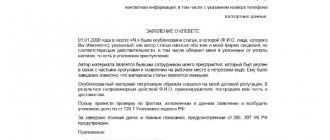Concept, content and types of land offenses
Legal protection of land, as one of the types of its protection, is a set of legal norms aimed at ensuring the rational use of land, preserving and improving its natural properties.
The need for legal protection of lands is enshrined in the Constitution of the Russian Federation. According to Art. 9 of the Constitution, land and other natural resources are used and protected in the Russian Federation as the basis for the life and activities of peoples.
One of the main methods of legal protection of land is legal liability for land violations.
In the theory of law, an offense is understood as a socially harmful guilty act of a capable subject that contradicts the requirements of legal norms.
In the literature on land law there are various definitions of land offence. So, R.K. Gusev believes that a land offense is a guilty unlawful act (action or inaction) directed against the land system established by the Constitution of the Russian Federation and other legislation, the procedure for managing and using land, its protection, as well as against the land rights and interests of legal entities and citizens.
According to O.I. Krassov, land violation is a negative social phenomenon, the result of which is an encroachment on the existing land legal order in the country, the purpose of which is to ensure the rational use and protection of land and the protection of persons using land plots.
Personal characteristics, family and business ties, nationality, affiliation with any party, or individuals are not considered offenses if they were not manifested in acts that violate the order in the field of protection and use of land.
The wrongfulness of an act means that any offense or crime constitutes a failure to fulfill a duty that is clearly stated in the relevant regulatory legal act, both law and regulation. Therefore, punishment cannot be imposed unless the offense or crime is provided for in the relevant law.
A feature of any offense is the deliberately harmful or socially dangerous nature of the act, which damages the interests of the individual, the state, society as a whole, and land law and order.
The object of the offense is the social relations enshrined in legislation that arise regarding land in its legal understanding.
The objective side is formed by an unlawful act committed in violation of land legislation.
The subjects of land offenses are individuals (citizens or officials) and legal entities.
The subjective side is expressed in the presence of guilt of the offender. There are two types of guilt: intentional and careless.
At the same time, in the event of harm caused by enterprises, institutions and organizations whose activities are associated with an increased danger to the environment, liability arises regardless of the presence of fault, unless the causer of harm proves that the harm arose as a result of force majeure or the intent of the victim.
Classification: administrative and civil offenses, disciplinary offenses.
The procedure for bringing to administrative, criminal or civil liability is strictly regulated by the relevant codes: criminal procedure, code of administrative offenses and civil procedure.
Concept and types of legal liability for land offenses
Legal liability for land offenses is regulated by the norms of land, criminal, administrative, labor, civil law, as well as the norms of the relevant procedural branches.
Moreover, in most cases, the provisions of land legislation are of a reference nature, addressing issues of bringing to legal liability to special legislation - the Criminal and Civil Codes, the Code of Administrative Offenses of the Russian Federation.
Legal responsibility is state coercion to fulfill the requirements of rights; a legal relationship, one of the parties to which is obliged to answer for its actions to the other party - society, the state.
Legal liability occurs in the presence of conditions called legal and factual grounds:
· the presence of a norm prohibiting behavior or obliging one to take a certain action;
· fact of non-compliance with this norm;
· presence of guilt of the offender;
· presence of a cause-and-effect relationship.
The main types of legal liability are:
· criminal law;
· administrative and legal;
· civil law;
· disciplinary (in relation to labor relations of workers performing certain types of activities related to land law).
Land crimes
Persons guilty of committing crimes, i.e. socially dangerous acts that fall within the scope of the articles of the Criminal Code of the Russian Federation are subject to criminal liability.
Land crime is a criminally committed, socially dangerous act prohibited by criminal law under threat of punishment. Criminal liability for land crimes occurs in accordance with the Criminal Code of the Russian Federation.
Subjects are only individuals.
It should be noted that there is a small number of purely “land” compositions in the Criminal Code of the Russian Federation. Since land legislation is closely related to environmental legislation, many provisions are indirectly “projected” onto land legal relations.
The Criminal Code of the Russian Federation provides for the following provisions related to land or other environmental legal relations.
These include:
· violation of environmental protection rules during the performance of work (Article 246 of the Criminal Code of the Russian Federation);
· violation of the rules for handling environmentally hazardous substances and waste (Article 247 of the Criminal Code of the Russian Federation);
· water pollution (Article 249 of the Criminal Code of the Russian Federation);
· damage to land (Article 254 of the Criminal Code of the Russian Federation);
· violation of the regime of specially protected natural areas and natural objects (Article 262 of the Criminal Code of the Russian Federation).
The disposition of Art. directly relates to land legal relations. 254 of the Criminal Code of the Russian Federation.
According to this article, poisoning, contamination or other damage to land with harmful products of economic or other activities due to violation of the rules for handling fertilizers, plant growth stimulants, pesticides or other hazardous substances during their storage, use and transportation, resulting in harm to human health or the environment, is grounds for criminal prosecution.
Administrative liability for land offenses
Administrative liability is applied for the commission of illegal actions, which, compared to criminal offenses, are characterized by a lower degree of public danger. The main feature of administrative liability is the predominantly extrajudicial procedure for assigning and applying sanctions.
According to the Code of Administrative Offenses of the Russian Federation, an administrative offense is recognized as a guilty, unlawful act, action or inaction of an individual, official or legal entity for which administrative liability is provided.
There are 20 offenses, the dispositions of which are reflected in Chapter. 7 and 8 Code of Administrative Offenses of the Russian Federation.
1st group - acts that violate the right of ownership and the right to use a land plot.
These include:
· unauthorized occupation of a land plot;
· destruction of boundary signs;
· use of subsoil without a permit (license) or in violation of the conditions stipulated by the permit (license);
· unauthorized occupation of a water body or use of it without permission (license);
· unauthorized occupation of a forest fund plot or a forest plot not included in the forest fund, unauthorized assignment of the right to use land, subsoil, forest fund plot, forest plot not included in the forest fund, or a water body.
2nd group - violation of the order of state administration in the field of land use. This group includes violations in construction, industry, land reclamation, where mandatory state control is necessary.
Group 3 - violations of requirements in the field of land protection. A number of “ecological” compounds can also be included in this group.
For example:
· violation of requirements for the protection and rational use of subsoil and hydromineral resources;
· violation of water or forest use rules;
· damage to agricultural and other lands;
· untimely return of temporarily occupied lands or failure to bring them into a condition suitable for their intended use;
· use of land for purposes other than its intended purpose, failure to implement mandatory measures to improve land and protect soils.
As noted above, subjects can be not only individuals (officials), but also legal entities.
Disciplinary and financial liability.
The measures and procedure for applying disciplinary and financial liability are provided for by the Labor Code of the Russian Federation of 2001 (hereinafter referred to as the Labor Code of the Russian Federation), as well as other legislative acts specified in Art. 75 of the Land Code of the Russian Federation.
The peculiarity of the application of disciplinary liability is expressed primarily in the fact that it occurs in accordance with the norms of labor legislation or in accordance with special provisions, charters, internal rules governing labor relations1. The object of a disciplinary offense is the complex (set) of labor and land social relations. The subject of such an offense may be a person whose job responsibilities include performing the functions of organizing land use, carrying out a system of measures related to increasing soil fertility, protecting land, etc. (for example, an agronomist, a sanitary doctor, a land management worker).
For committing a disciplinary offense, the employer has the right to apply the following disciplinary sanctions to him: 1) reprimand; 2) reprimand; 3) dismissal on appropriate grounds (Article 192 of the Labor Code of the Russian Federation).
It should be remembered that Art. 75 of the Land Code of the Russian Federation established additional grounds for the application of disciplinary measures: officials and employees of the organization guilty of committing land offenses bear disciplinary liability in cases where, as a result of improper performance of their official or labor duties, the organization incurred administrative liability for the design, placement and commissioning of facilities that have a negative (harmful) impact on the condition of the land, its contamination with chemical and radioactive substances, industrial waste and wastewater.
Financial liability is the liability established by labor, and not civil legislation, of workers and officials through whose fault enterprises, institutions and organizations incurred expenses to compensate for damage caused by a land violation.
Financial liability consists of the obligation of an employee to compensate, in the prescribed manner and in certain amounts, for property damage caused through his fault to an enterprise or organization as a result of improper performance of his job duties.
To bring an employee to financial liability, the following conditions for its occurrence are necessary:
1. Causing direct actual damage by the employee. Lost income (improved benefit) is not subject to recovery from the employee (Article 238 of the Labor Code of the Russian Federation);
2. Illegal behavior (action or inaction) of the employee;
3. Guilt (intention or negligence) of the employee in causing damage;
4. The presence of a causal connection between the employee’s behavior and the resulting damage.
The presence of all four of these conditions gives the employer the right to hold the employee financially liable.
Labor legislation establishes two types of financial liability for an employee: limited, which is expressed in the employee’s obligation to compensate for the damage caused, but within the limits of no more than his average monthly earnings (Article 241 of the Labor Code of the Russian Federation) and full, only in the cases specified in Art. 243 Labor Code of the Russian Federation .
Civil liability.
Civil (property) liability consists mainly of imposing on the offender the obligation to compensate the injured party for property and moral damage caused as a result of a land offense.
General provisions concerning compensation for harm caused to the owner of the land, land owner, land user or tenant of the land plot as a result of violation of land legislation are determined by the norms of civil law.
According to Art. 76 of the Land Code of the Russian Federation, legal entities and citizens are obliged to compensate in full for the damage caused as a result of their commission of land offenses.
There are two main methods of compensation for damage - real (Article 76 of the Land Code of the Russian Federation) by restoring the physical and chemical characteristics of lands, or in the form of compensation for losses caused, including costs for land restoration (Article 61 of the Land Code).
The basic principles of compensation for harm are reflected in the Civil Code of the Russian Federation:
· the harm must be real;
· the obligation of the harm-cauter to pay compensation, including in excess of compensation for harm;
· damage is subject to compensation in full;
· the court may impose restrictions or prohibitions on the activities of individuals or legal entities that caused harm, in order to further prevent harm;
· special conditions are provided for compensation for damage caused by a source of increased danger in accordance with Art. Art. 1064, 1065, 1079 Civil Code of the Russian Federation;
· by a court decision, damage can be completely annulled, including cases if it arose as a result of force majeure circumstances.
Similar principles are reflected in the Civil Code of the Russian Federation on the issue of compensation for losses.
Both losses and lost profits are compensated in full from the relevant budgets or by the persons in whose favor the land plots are seized or the rights to them are limited.
If a person’s right is violated, then in accordance with Art. 15 of the RF Land Code, it may demand full compensation for losses. Losses are understood as expenses that a person whose right has been violated has made or will have to make to restore the violated right, loss or damage to property (real damage), as well as lost income that this person would have received under normal conditions of civil circulation if his the right would not have been violated (lost profits).
Art. 16 of the Civil Code of the Russian Federation also provides for compensation by the Russian Federation, constituent entities of the Russian Federation, and municipalities for losses caused as a result of illegal actions (inaction), including the issuance of an act that does not correspond to a higher legal act.
According to general rules, losses are compensated in cases:
· seizure of land plots for state or municipal needs;
· requisition of land;
· restrictions on the rights of landowners in special zones (usually of a fixed-compensatory nature);
· changing the intended purpose of a land plot on the basis of a petition from a state authority or local government body to transfer the plot from one category of land to another without the consent of the land owner;
· compensation for damages in case of illegal actions.
For violation of certain requirements of land legislation, expressed in improper use of the provided land plot, a sanction such as forced termination of the right to such land plot is provided. Another type of civil liability involves the fulfillment of obligations in kind, for example, the restoration of degraded or disturbed soils, the construction of demolished buildings and structures, the elimination of other offenses in the field of land use.
Criminal liability for land offenses
When committing a land offense, which is a socially dangerous act, or a crime, the guilty person is held accountable in accordance with the Criminal Code of the Russian Federation.
Types of offenses for which criminal liability is provided:
- registration of obviously illegal transactions with land, distortion of registration data of the state land cadastre, deliberate understatement of payments for land, if these acts were committed by an official out of personal interest using his official position;
- poisoning, contamination or other damage to the land with harmful products due to violation of the rules for handling fertilizers, plant growth stimulants, pesticides and other hazardous substances, if as a result, harm was caused to human health or the environment.
Note 3
In addition, the Land Code of the Russian Federation provides for the possibility of applying disciplinary measures against officials or employees of organizations that violate legislation in the field of land use or protection.
Concept, content and types of land offenses
Legal protection of land, as one of the types of its protection, is a set of legal norms aimed at ensuring the rational use of land, preserving and improving its natural properties.
The need for legal protection of lands is enshrined in the Constitution of the Russian Federation. According to Art. 9 of the Constitution, land and other natural resources are used and protected in the Russian Federation as the basis for the life and activities of peoples.
One of the main methods of legal protection of land is legal liability for land violations.
In the theory of law, an offense is understood as a socially harmful guilty act of a capable subject that contradicts the requirements of legal norms.
In the literature on land law there are various definitions of land offence. So, R.K. Gusev believes that a land offense is a guilty unlawful act (action or inaction) directed against the land system established by the Constitution of the Russian Federation and other legislation, the procedure for managing and using land, its protection, as well as against the land rights and interests of legal entities and citizens.
According to O.I. Krassov, land violation is a negative social phenomenon, the result of which is an encroachment on the existing land legal order in the country, the purpose of which is to ensure the rational use and protection of land and the protection of persons using land plots.
Personal characteristics, family and business ties, nationality, affiliation with any party, or individuals are not considered offenses if they were not manifested in acts that violate the order in the field of protection and use of land.
The wrongfulness of an act means that any offense or crime constitutes a failure to fulfill a duty that is clearly stated in the relevant regulatory legal act, both law and regulation. Therefore, punishment cannot be imposed unless the offense or crime is provided for in the relevant law.
A feature of any offense is the deliberately harmful or socially dangerous nature of the act, which damages the interests of the individual, the state, society as a whole, and land law and order.
The object of the offense is the social relations enshrined in legislation that arise regarding land in its legal understanding.
The objective side is formed by an unlawful act committed in violation of land legislation.
The subjects of land offenses are individuals (citizens or officials) and legal entities.
The subjective side is expressed in the presence of guilt of the offender. There are two types of guilt: intentional and careless.
At the same time, in the event of harm caused by enterprises, institutions and organizations whose activities are associated with an increased danger to the environment, liability arises regardless of the presence of fault, unless the causer of harm proves that the harm arose as a result of force majeure or the intent of the victim.
Classification: administrative and civil offenses, disciplinary offenses.
The procedure for bringing to administrative, criminal or civil liability is strictly regulated by the relevant codes: criminal procedure, code of administrative offenses and civil procedure.
Concept and types of legal liability for land offenses
Legal liability for land offenses is regulated by the norms of land, criminal, administrative, labor, civil law, as well as the norms of the relevant procedural branches.
Moreover, in most cases, the provisions of land legislation are of a reference nature, addressing issues of bringing to legal liability to special legislation - the Criminal and Civil Codes, the Code of Administrative Offenses of the Russian Federation.
Legal responsibility is state coercion to fulfill the requirements of rights; a legal relationship, one of the parties to which is obliged to answer for its actions to the other party - society, the state.
Legal liability occurs in the presence of conditions called legal and factual grounds:
· the presence of a norm prohibiting behavior or obliging one to take a certain action;
· fact of non-compliance with this norm;
· presence of guilt of the offender;
· presence of a cause-and-effect relationship.
The main types of legal liability are:
· criminal law;
· administrative and legal;
· civil law;
· disciplinary (in relation to labor relations of workers performing certain types of activities related to land law).
Land crimes
Persons guilty of committing crimes, i.e. socially dangerous acts that fall within the scope of the articles of the Criminal Code of the Russian Federation are subject to criminal liability.
Land crime is a criminally committed, socially dangerous act prohibited by criminal law under threat of punishment. Criminal liability for land crimes occurs in accordance with the Criminal Code of the Russian Federation.
Subjects are only individuals.
It should be noted that there is a small number of purely “land” compositions in the Criminal Code of the Russian Federation. Since land legislation is closely related to environmental legislation, many provisions are indirectly “projected” onto land legal relations.
The Criminal Code of the Russian Federation provides for the following provisions related to land or other environmental legal relations.
These include:
· violation of environmental protection rules during the performance of work (Article 246 of the Criminal Code of the Russian Federation);
· violation of the rules for handling environmentally hazardous substances and waste (Article 247 of the Criminal Code of the Russian Federation);
· water pollution (Article 249 of the Criminal Code of the Russian Federation);
· damage to land (Article 254 of the Criminal Code of the Russian Federation);
· violation of the regime of specially protected natural areas and natural objects (Article 262 of the Criminal Code of the Russian Federation).
The disposition of Art. directly relates to land legal relations. 254 of the Criminal Code of the Russian Federation.
According to this article, poisoning, contamination or other damage to land with harmful products of economic or other activities due to violation of the rules for handling fertilizers, plant growth stimulants, pesticides or other hazardous substances during their storage, use and transportation, resulting in harm to human health or the environment, is grounds for criminal prosecution.
Administrative liability for land offenses
Administrative liability is applied for the commission of illegal actions, which, compared to criminal offenses, are characterized by a lower degree of public danger. The main feature of administrative liability is the predominantly extrajudicial procedure for assigning and applying sanctions.
According to the Code of Administrative Offenses of the Russian Federation, an administrative offense is recognized as a guilty, unlawful act, action or inaction of an individual, official or legal entity for which administrative liability is provided.
There are 20 offenses, the dispositions of which are reflected in Chapter. 7 and 8 Code of Administrative Offenses of the Russian Federation.
1st group - acts that violate the right of ownership and the right to use a land plot.
These include:
· unauthorized occupation of a land plot;
· destruction of boundary signs;
· use of subsoil without a permit (license) or in violation of the conditions stipulated by the permit (license);
· unauthorized occupation of a water body or use of it without permission (license);
· unauthorized occupation of a forest fund plot or a forest plot not included in the forest fund, unauthorized assignment of the right to use land, subsoil, forest fund plot, forest plot not included in the forest fund, or a water body.
2nd group - violation of the order of state administration in the field of land use. This group includes violations in construction, industry, land reclamation, where mandatory state control is necessary.
Group 3 - violations of requirements in the field of land protection. A number of “ecological” compounds can also be included in this group.
For example:
· violation of requirements for the protection and rational use of subsoil and hydromineral resources;
· violation of water or forest use rules;
· damage to agricultural and other lands;
· untimely return of temporarily occupied lands or failure to bring them into a condition suitable for their intended use;
· use of land for purposes other than its intended purpose, failure to implement mandatory measures to improve land and protect soils.
As noted above, subjects can be not only individuals (officials), but also legal entities.
Disciplinary and financial liability.
The measures and procedure for applying disciplinary and financial liability are provided for by the Labor Code of the Russian Federation of 2001 (hereinafter referred to as the Labor Code of the Russian Federation), as well as other legislative acts specified in Art. 75 of the Land Code of the Russian Federation.
The peculiarity of the application of disciplinary liability is expressed primarily in the fact that it occurs in accordance with the norms of labor legislation or in accordance with special provisions, charters, internal rules governing labor relations1. The object of a disciplinary offense is the complex (set) of labor and land social relations. The subject of such an offense may be a person whose job responsibilities include performing the functions of organizing land use, carrying out a system of measures related to increasing soil fertility, protecting land, etc. (for example, an agronomist, a sanitary doctor, a land management worker).
For committing a disciplinary offense, the employer has the right to apply the following disciplinary sanctions to him: 1) reprimand; 2) reprimand; 3) dismissal on appropriate grounds (Article 192 of the Labor Code of the Russian Federation).
It should be remembered that Art. 75 of the Land Code of the Russian Federation established additional grounds for the application of disciplinary measures: officials and employees of the organization guilty of committing land offenses bear disciplinary liability in cases where, as a result of improper performance of their official or labor duties, the organization incurred administrative liability for the design, placement and commissioning of facilities that have a negative (harmful) impact on the condition of the land, its contamination with chemical and radioactive substances, industrial waste and wastewater.
Financial liability is the liability established by labor, and not civil legislation, of workers and officials through whose fault enterprises, institutions and organizations incurred expenses to compensate for damage caused by a land violation.
Financial liability consists of the obligation of an employee to compensate, in the prescribed manner and in certain amounts, for property damage caused through his fault to an enterprise or organization as a result of improper performance of his job duties.
To bring an employee to financial liability, the following conditions for its occurrence are necessary:
1. Causing direct actual damage by the employee. Lost income (improved benefit) is not subject to recovery from the employee (Article 238 of the Labor Code of the Russian Federation);
2. Illegal behavior (action or inaction) of the employee;
3. Guilt (intention or negligence) of the employee in causing damage;
4. The presence of a causal connection between the employee’s behavior and the resulting damage.
The presence of all four of these conditions gives the employer the right to hold the employee financially liable.
Labor legislation establishes two types of financial liability for an employee: limited, which is expressed in the employee’s obligation to compensate for the damage caused, but within the limits of no more than his average monthly earnings (Article 241 of the Labor Code of the Russian Federation) and full, only in the cases specified in Art. 243 Labor Code of the Russian Federation .
Types of administrative offenses in the field of land use
Administrative offenses include:
- unauthorized occupation of a land plot or use of it without duly executed documents permitting economic activity;
- destruction of boundary signs of land boundaries;
- unauthorized occupation of a land plot of a coastal protective strip of a water body or a zone of sanitary protection of sources of drinking and domestic water supply;
- unauthorized occupation of a forest fund plot or a forest plot not included in the forest fund;
- unauthorized assignment of the right to use land, a forest fund site, forest territory not included in the forest fund, as well as unauthorized exchange of plots;
- illegal allocation of land plots on specially protected lands of historical and cultural significance;
- unauthorized removal or movement of the fertile soil layer, its destruction, as well as damage to land as a result of violation of the rules for handling pesticides and agrochemicals;
- failure to fulfill obligations to bring land into a condition suitable for use for its intended purpose;
- misuse of land, failure to implement mandatory measures to improve and protect soils;
- violation of the procedure for the provision and legal regime of land plots in water protection zones and coastal strips of water bodies;
- destruction or damage to hayfields and pastures, reclamation systems, as well as roads on forest fund lands or in forests not included in the forest fund;
- carrying out reclamation work in violation of approved projects;
- illegal plowing of land, mowing grass, grazing livestock, cutting or damaging plantings, removing turf or excavating soil;
- discharge of sewer, industrial, reclamation or wastewater into drainage structures or reserves on the right of way of the highway;
- laying utility lines, installing outdoor advertising, road signs and indicators, or placing service facilities without the consent of the road authorities;
- lighting a fire on the right-of-way and within 100 meters of wooden bridges or smoking on bridges with wooden decks;
- violation by land users of rules for the protection of highways or road structures;
- violation by state or municipal authorities of the deadlines for considering applications for the provision of land plots;
- failure to comply with the procedure for state registration of rights to real estate or transactions with it.
Note 2
For all of the above types of offenses in the field of protection and use of land, administrative liability is provided in the form of a warning or a fine. The authorities of the Federal Land Cadastre Service, the Ministry of Natural Resources of the Russian Federation, sanitary and epidemiological supervision, as well as the courts have the right to apply such penalties.








